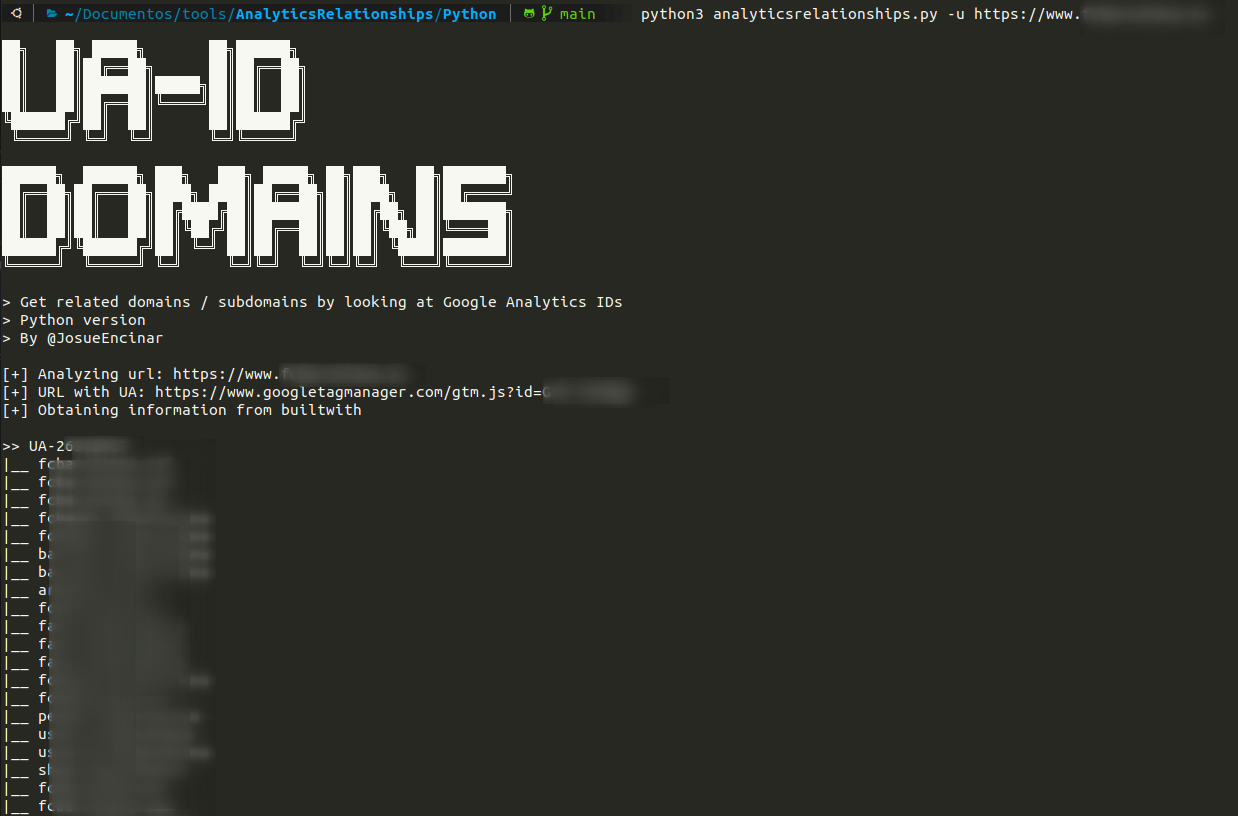Awesome
<h1 align="center"> <b>AnalyticsRelationships</b> <br> </h1> <p align="center"> <a href="https://golang.org/dl/#stable"> <img src="https://img.shields.io/badge/go-1.16-blue.svg?style=flat-square&logo=go"> </a> <a href="https://www.python.org/"> <img src="https://img.shields.io/badge/python-3.6+-blue.svg?style=flat-square&logo=go"> </a> <a href="https://www.gnu.org/licenses/gpl-3.0.en.html"> <img src="https://img.shields.io/badge/license-GNU-green.svg?style=square&logo=gnu"> <a href="https://twitter.com/JosueEncinar"> <img src="https://img.shields.io/badge/author-@JosueEncinar-orange.svg?style=square&logo=twitter"> </a> </p> <p align="center"> This script try to get related domains / subdomains by looking at Google Analytics IDs from a URL. First search for ID of Google Analytics in the webpage and then request to <b>builtwith</b> and <b>hackertarget</b> with the ID. </p> <br/> <hr/>Note: It does not work with all websites. It is searched by the following expressions:
-> "www\.googletagmanager\.com/ns\.html\?id=[A-Z0-9\-]+"
-> GTM-[A-Z0-9]+
-> "UA-\d+-\d+"
Available versions:
Installation:
Installation according to language.
Python
> git clone https://github.com/Josue87/AnalyticsRelationships.git
> cd AnalyticsRelationships/Python
> sudo pip3 install -r requirements.txt
GO
> git clone https://github.com/Josue87/AnalyticsRelationships.git
> cd AnalyticsRelationships/
> go build -ldflags "-s -w"
Docker
> git clone https://github.com/Josue87/AnalyticsRelationships.git
> cd AnalyticsRelationships
> docker build -t analyticsrelationships:latest .
Usage
Usage according to language
Python
> python3 analyticsrelationships.py -u https://www.example.com
Or redirect output to a file (banner or information messages are sent to the error output):
python3 analyticsrelationships.py -u https://www.example.com > /tmp/example.txt
GO
> ./analyticsrelationships --url https://www.example.com
Or redirect output to a file (banner or information messages are sent to the error output):
> ./analyticsrelationships --url https://www.example.com > /tmp/example.txt
You can also pass a file as input
> cat file.txt | ./analyticsrelationships
Or a single URL
> echo https://www.example.com | ./analyticsrelationships
Docker
Only Python Version.
> docker run -it analyticsrelationships:latest https://www.example.com
Or redirect output to a file (banner or information messages are sent to the error output):
> docker run -it analyticsrelationships:latest https://www.example.com > /tmp/example.txt
Examples
Python
Output redirection to file /tmp/example.txt:

Without redirection:

GO
Without redirection:

Working with file redirection works just like in Python.
An example with a file:

Disclaimer!
This is a PoC. The author is not responsible for any illegitimate use.